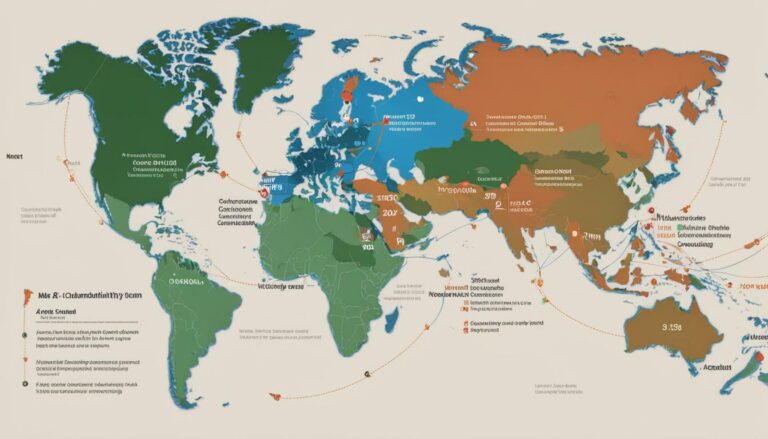Guide: How to Check Your Eligibility for Canadian Immigration Programs
Are you interested in immigrating to Canada? Read this comprehensive guide on how to check your eligibility for Canadian immigration programs.
To check your eligibility for Canadian immigration programs, you need to consider various factors. One important factor is what you want to do in Canada, as different permits and visas may be required depending on your purpose. Another important consideration is how long you plan to stay in Canada. You also need to select the code that matches the one on your passport and indicate your current country of residence.
One popular pathway to permanent residence in Canada is through the Express Entry system. Express Entry is a fast and popular program that aims to welcome about 300,000 economic immigrants each year. To determine your eligibility for Express Entry, you need to calculate your Comprehensive Ranking System (CRS) score, which takes into account factors such as age, education, language proficiency, work experience, and connections to Canada. The CRS score cut-off may vary, and there is no minimum score for Express Entry. Taking the IELTS exam can help increase your CRS score, and having a job offer can add points as well.
Besides Express Entry, there are other ways to immigrate to Canada, such as through Provincial Nominee Programs (PNPs), business immigration programs, and sponsorship by a Canadian citizen or permanent resident. Each program has its own eligibility requirements and application process.
Determining your eligibility to immigrate to Canada involves assessing your qualifications and meeting the necessary criteria. It is important to gather the required documents and be prepared to demonstrate your work experience, education, identity, and criminal and medical background. The cost of immigrating to Canada varies depending on the program, and proof of settlement funds may be required in some cases.
While immigrating to Canada may not be easy, there are numerous pathways and options available to suit different individuals and situations.
Key Takeaways:
- Check your eligibility for Canadian immigration programs based on factors such as your purpose, duration of stay, and current country of residence.
- Calculate your Comprehensive Ranking System (CRS) score to determine eligibility for the Express Entry system.
- Consider other immigration pathways in Canada, including Provincial Nominee Programs (PNPs), business immigration programs, and sponsorship by a Canadian citizen or permanent resident.
- Assess your qualifications and meet the necessary criteria for Canadian immigration programs by gathering the required documents and demonstrating your work experience, education, and background.
- Be prepared for the costs associated with immigrating to Canada and provide proof of settlement funds, if required.
Factors to Consider for Canadian Immigration
Before starting the eligibility assessment, take into account factors such as your purpose for coming to Canada, duration of stay, and your current country of residence. These considerations will help determine the appropriate permits and visas required for your specific situation.
1. Purpose for Coming to Canada
Identifying your purpose for immigrating to Canada is crucial as it will determine the appropriate immigration program to pursue. Whether you are seeking economic opportunities, joining family members, or studying in Canada, each program has its own eligibility criteria and requirements.
2. Duration of Stay
Consider how long you plan to stay in Canada. Temporary visas, such as work permits or study permits, may be suitable for shorter stays, while permanent residency programs, like Express Entry or Provincial Nominee Programs (PNPs), are intended for those seeking to establish long-term residence in Canada.
3. Current Country of Residence
Your current country of residence can have an impact on your eligibility for certain immigration programs. Some programs may have specific requirements or limitations based on nationality, while others may prioritize applicants from certain countries or regions. It’s important to research any country-specific considerations that may affect your eligibility.
4. Comprehensive Ranking System (CRS) Score
If you are considering applying for the Express Entry program, you will need to calculate your Comprehensive Ranking System (CRS) score. The CRS score is based on factors such as age, education, language proficiency, work experience, and connections to Canada. A higher CRS score increases your chances of receiving an invitation to apply for permanent residency.
| Factors | Points |
|---|---|
| Age (up to 12 points) | 12 |
| Education (up to 25 points) | 25 |
| Language Proficiency (up to 24 points) | 24 |
| Work Experience (up to 15 points) | 15 |
| Canadian Job Offer (up to 10 points) | 10 |
| Provincial Nomination (up to 600 points) | 600 |
It’s important to note that while these factors contribute to your CRS score, meeting the minimum requirements does not guarantee an invitation to apply for permanent residency. The required CRS score may vary with each Express Entry draw.
By considering these factors, you can assess your eligibility for Canadian immigration programs more effectively and choose the pathway that aligns with your goals and qualifications.
Express Entry: A Pathway to Permanent Residence
One of the pathways to permanent residence in Canada is through the Express Entry system, which requires meeting specific eligibility requirements. Express Entry is a fast and popular program that aims to welcome about 300,000 economic immigrants each year. To determine your eligibility for Express Entry, you need to calculate your Comprehensive Ranking System (CRS) score, which takes into account factors such as age, education, language proficiency, work experience, and connections to Canada.
The CRS score cut-off may vary, and there is no minimum score for Express Entry. Taking the IELTS exam can help increase your CRS score, and having a job offer can add points as well. By scoring high on the CRS, you have a better chance of receiving an Invitation to Apply (ITA) for permanent residence in Canada. Once you receive an ITA, you will have 90 days to submit your application for permanent residence.
It is important to note that meeting the eligibility requirements for Express Entry does not guarantee approval. If you are invited to apply, you must still meet the admissibility requirements, including medical and security checks. The application process requires gathering the necessary documents and providing accurate and truthful information about your education, work experience, language proficiency, and personal background.
Express Entry Eligibility Requirements
| Eligibility Criteria | Requirements |
|---|---|
| Age | Must be at least 18 years old |
| Educational Qualifications | Must have completed a Canadian secondary or post-secondary education, or have an Educational Credential Assessment (ECA) if educated outside Canada |
| Language Proficiency | Must demonstrate proficiency in English or French through language tests (e.g., IELTS, CELPIP, or TEF) |
| Work Experience | Must have at least one year of continuous full-time or equivalent part-time skilled work experience in a qualifying occupation |
By understanding the eligibility requirements for Express Entry, you can assess your qualifications and determine if you meet the criteria. It is important to accurately evaluate your eligibility before proceeding with the application process. If you do not meet the requirements, there are other immigration pathways in Canada, such as Provincial Nominee Programs (PNPs) and business immigration programs, that may be suitable for your situation.
Comprehensive Ranking System (CRS) Score Calculation
To assess your eligibility for Express Entry, you need to calculate your Comprehensive Ranking System (CRS) score, which takes into account various factors such as age, education, language proficiency, work experience, and connections to Canada. The CRS score is used to rank candidates in the Express Entry pool, and the candidates with the highest scores are invited to apply for permanent residence.
The CRS score is calculated based on a maximum of 1,200 points, which are divided into different categories. The categories include core human capital factors, spouse or common-law partner factors, skill transferability factors, and additional factors. Each category has its own point allocation, and the total score determines your eligibility for Express Entry.
| Category | Maximum Points |
|---|---|
| Core Human Capital Factors | 500 |
| Spouse or Common-Law Partner Factors | 40 |
| Skill Transferability Factors | 100 |
| Additional Factors | 600 |
Within each category, specific criteria are evaluated to determine the number of points awarded. For example, in the core human capital factors category, points are allocated based on your age, education level, official language proficiency, work experience, and whether you have a valid job offer in Canada or a provincial/territorial nomination. The higher your score in each category, the better your chances of receiving an invitation to apply for permanent residence.
It’s important to note that the CRS score cut-off may vary with each Express Entry draw, as it depends on the number of candidates in the pool and the annual immigration targets set by the Canadian government. To increase your CRS score, you can improve your language proficiency, gain more work experience, or obtain a valid job offer from a Canadian employer. Taking steps to improve your score can significantly enhance your chances of becoming eligible for Canadian immigration programs.
Increasing CRS Score and Additional Points
Taking the IELTS exam and securing a job offer can help increase your CRS score and improve your chances of being eligible for Express Entry. The IELTS exam assesses your language proficiency in English or French, which are two official languages in Canada. Obtaining a high score in this exam can earn you valuable points towards your CRS score. It is important to prepare and practice for the exam to achieve the best results.
Another way to boost your CRS score is by securing a job offer from a Canadian employer. A valid job offer can significantly increase your chances of being selected for Express Entry as it demonstrates your commitment to working and contributing to the Canadian economy. To be eligible, the job offer must meet certain criteria and be supported by a Labour Market Impact Assessment (LMIA) or be classified as an exemption.
In addition to the IELTS exam and job offers, there are other strategies to earn additional points for your CRS score. For example, obtaining a higher level of education or completing a post-secondary degree in Canada can add valuable points. You can also gain points through Canadian work experience, with more points awarded for longer durations of work experience. Taking steps to improve your language proficiency, such as enrolling in language courses, can also boost your CRS score.
| CRS Score Booster Strategies | Points Earned |
|---|---|
| Taking the IELTS exam | +10 to +40 points |
| Securing a valid job offer | +50 to +200 points |
| Obtaining a higher level of education | +15 to +30 points |
| Canadian work experience | +10 to +80 points |
By implementing these strategies and earning additional points, you can significantly increase your CRS score and enhance your eligibility for Canadian immigration programs. It is crucial to carefully evaluate your options and choose the strategies that best align with your qualifications and goals. Remember, every point counts when it comes to expressing your interest in becoming a permanent resident of Canada through the Express Entry system.
Other Immigration Pathways in Canada
In addition to Express Entry, there are several other immigration programs in Canada with their own eligibility requirements and application processes. These pathways provide alternative options for individuals who may not meet the criteria for Express Entry or prefer a different route to permanent residence.
One such pathway is the Provincial Nominee Program (PNP), which allows provinces and territories in Canada to nominate individuals for immigration based on their specific economic needs. Each province or territory has its own set of eligibility criteria and application process, which typically involves demonstrating a connection to the province, such as previous work experience or education in the area. The PNP is a popular choice for individuals with specific skills or experience that align with the needs of a particular province or territory.
Another option is the business immigration programs, which are designed for individuals who wish to invest or start a business in Canada. These programs typically require a significant investment or the creation of job opportunities for Canadian citizens or permanent residents. Business immigrants can choose from different programs, such as the Start-up Visa Program, the Self-Employed Program, or the Entrepreneur Program, depending on their specific circumstances and business goals.
| Immigration Program | Eligibility Requirements | Application Process |
|---|---|---|
| Provincial Nominee Program (PNP) | Varies by province/territory | Apply directly to the province/territory |
| Business Immigration Programs | Depends on specific program | Apply through the relevant program stream |
| Family Sponsorship | Must have a Canadian citizen or permanent resident sponsor | Sponsorship application through IRCC |
Family Sponsorship
Another pathway to Canadian immigration is through family sponsorship. If you have a Canadian citizen or permanent resident family member, they may be able to sponsor you for permanent residence. This program is designed to reunite families and allows eligible Canadian citizens or permanent residents to bring their close family members to Canada. The sponsor must meet certain income requirements and provide financial support to the sponsored individual for a specified period of time.
It’s important to note that each immigration program has its own eligibility requirements and application process. It’s advisable to thoroughly research and understand the specific requirements of the program you are interested in before beginning the application process. Consulting with an immigration lawyer or a registered immigration consultant can also provide valuable guidance and assistance throughout the application process.
Conclusion
With various immigration pathways and programs available, assessing your eligibility for Canadian immigration requires careful consideration of your qualifications and goals. Whether you choose Express Entry, a provincial nomination, business immigration, or family sponsorship, each program has its own unique requirements and benefits. It’s important to thoroughly research these programs and consult with professionals to ensure you choose the pathway that best suits your situation and maximizes your chances of achieving your immigration goals.
Qualifications and Criteria Assessment
Determining your eligibility for Canadian immigration involves evaluating your qualifications and ensuring you meet the specific criteria for the program you are interested in. The process requires careful assessment and documentation of your education, work experience, language proficiency, age, and other relevant factors.
One of the key qualifications to consider is your level of education. Canadian immigration programs often require a certain level of education, such as a diploma or degree from a recognized institution. It’s important to provide proof of your qualifications through transcripts, diplomas, and degrees.
Work experience is another important factor in the eligibility assessment. Canadian immigration programs often prioritize candidates with relevant work experience in specific occupations or industries. You may need to provide reference letters, employment contracts, or other documentation to demonstrate your work experience.
| Factors to Consider | Documents Required |
|---|---|
| Education | Transcripts, diplomas, degrees |
| Work Experience | Reference letters, employment contracts |
| Language Proficiency | Language test results (e.g., IELTS, CELPIP) |
| Age | Birth certificate or other proof of age |
Language proficiency is another crucial factor in Canadian immigration eligibility. You may be required to take a language test, such as the IELTS or CELPIP, to demonstrate your proficiency in English or French. Achieving high scores in these tests can greatly enhance your chances of qualifying for immigration programs.
Other criteria to consider include your age, adaptability factors, and any additional requirements specific to the program you are interested in. It is essential to carefully review the eligibility criteria provided by the Canadian government and ensure that you meet all the necessary requirements before proceeding with your application.
Summary:
- Evaluate your qualifications and ensure they meet the specific criteria for the immigration program you are interested in.
- Gather and provide the necessary documents, such as transcripts, diplomas, reference letters, and language test results.
- Consider factors such as education, work experience, language proficiency, and age in your eligibility assessment.
- Review the eligibility criteria provided by the Canadian government and ensure you meet all the requirements.
Document Preparation and Financial Requirements
To apply for Canadian immigration, you will need to gather and prepare various documents, as well as demonstrate your financial capacity to support yourself and your family. Proper document preparation is crucial to ensure a smooth and successful application process.
Start by organizing your personal documents, such as your passport, birth certificate, marriage certificate (if applicable), and any relevant identification documents. You will also need to provide proof of your educational qualifications, such as diplomas, degrees, and transcripts.
Additionally, you will need to demonstrate your work experience by providing reference letters, employment contracts, and pay stubs. It is important to gather documents that prove your language proficiency, such as English or French language test results, and any other certifications or licenses that may be required for your specific immigration program.
| Required Documents | Financial Requirements |
|---|---|
|
|
In addition to document preparation, you will also need to demonstrate your financial capacity to support yourself and your family in Canada. The specific financial requirements may vary depending on your immigration program and family size.
You will typically need to provide proof of settlement funds, which demonstrate that you have enough money to support yourself and your dependents upon arrival in Canada. The amount required will depend on the number of family members accompanying you. You may also be required to provide additional financial statements, such as bank statements, income tax returns, and proof of assets, to further demonstrate your financial stability.
Preparing the necessary documents and meeting the financial requirements are essential steps in the Canadian immigration process. By ensuring you have all the required documents and sufficient financial capacity, you can increase your chances of a successful application and a smooth transition to life in Canada.
Cost of Immigrating to Canada
The cost of immigrating to Canada varies depending on the program you choose, and you may need to provide proof of settlement funds as part of the application process. It is essential to be aware of the financial requirements and plan accordingly before embarking on your immigration journey.
Settlement Funds Requirements
For many Canadian immigration programs, including Express Entry, Provincial Nominee Programs (PNPs), and most family sponsorship programs, applicants are required to show proof of settlement funds. These funds are meant to ensure that individuals and families have enough money to support themselves upon arrival in Canada.
The specific amount of settlement funds required depends on the number of family members applying, and it is updated annually by the Canadian government. As of 2021, for a single individual, the minimum required amount is CAD $12,960. For a family of four, the minimum required amount is CAD $32,270. It is important to note that these amounts are subject to change, so it is crucial to consult the official government website or seek advice from an immigration consultant for the most up-to-date information.
Other Costs to Consider
In addition to the settlement funds requirement, there are other costs associated with immigrating to Canada. These may include application fees, language proficiency tests, educational credential assessments, medical examinations, and police clearances. It is essential to budget for these expenses and factor them into your overall immigration plan.
| Expense | Estimated Cost |
|---|---|
| Application Fees | Varies depending on the program |
| Language Proficiency Tests | Approximately CAD $300 |
| Educational Credential Assessment | Approximately CAD $300 |
| Medical Examinations | Varies depending on the country and the type of examination |
| Police Clearances | Varies depending on the country |
It is important to plan your finances carefully and ensure that you have enough funds to cover not only the application process but also the initial costs of settling in Canada. Adequate financial preparation will help make your immigration journey smoother and increase your chances of a successful transition to your new life in Canada.
Conclusion:
While immigrating to Canada may present its challenges, there are several pathways and options available to individuals with different qualifications and circumstances. By checking your eligibility for Canadian immigration programs, you can determine the best pathway for your immigration journey.
Factors such as what you want to do in Canada and how long you plan to stay play a crucial role in the immigration process. It is important to select the appropriate code that matches your passport and provide accurate information about your current country of residence.
The Express Entry system is a popular pathway to permanent residence in Canada. By calculating your Comprehensive Ranking System (CRS) score, you can evaluate your eligibility for Express Entry. Factors such as age, education, language proficiency, work experience, and connections to Canada contribute to your CRS score. Taking the IELTS exam and obtaining a job offer can increase your score and improve your chances of being invited to apply.
In addition to Express Entry, there are other immigration pathways available. Provincial Nominee Programs (PNPs), business immigration programs, and sponsorship by a Canadian citizen or permanent resident provide alternative routes to immigrate to Canada. Each program has its own eligibility requirements and application process.
When assessing your eligibility for Canadian immigration, it is crucial to gather the required documents and meet the necessary criteria. Documentation of work experience, education, identity, and criminal and medical background may be required. The cost of immigrating to Canada varies depending on the program, and proof of settlement funds may also be necessary.
While the journey to immigrating to Canada may not be easy, the numerous pathways and options available offer hope and opportunities for individuals seeking a better future in the country.
FAQ
Q: What factors should I consider when checking my eligibility for Canadian immigration programs?
A: You should consider your purpose in Canada, the length of your stay, your passport code, and your current country of residence.
Q: How can I determine my eligibility for Express Entry?
A: To determine your eligibility for Express Entry, you need to calculate your Comprehensive Ranking System (CRS) score, which takes into account factors such as age, education, language proficiency, work experience, and connections to Canada.
Q: Is there a minimum CRS score for Express Entry?
A: No, there is no minimum CRS score for Express Entry. The CRS score cut-off may vary, and having a higher score increases your chances of being invited to apply.
Q: How can I increase my CRS score for Express Entry?
A: Taking the IELTS exam can help increase your CRS score, as can having a valid job offer from a Canadian employer.
Q: Are there other pathways to immigrate to Canada besides Express Entry?
A: Yes, there are other pathways such as Provincial Nominee Programs (PNPs), business immigration programs, and sponsorship by a Canadian citizen or permanent resident.
Q: How can I assess my qualifications and meet the necessary criteria for Canadian immigration programs?
A: You need to gather the required documents and be prepared to demonstrate your work experience, education, identity, and criminal and medical background.
Q: What are the financial requirements for Canadian immigration?
A: The cost of immigrating to Canada varies depending on the program, and you may be required to provide proof of settlement funds in some cases.
Source Links
- https://onlineservices-servicesenligne.cic.gc.ca/c2c/
- https://www.canadim.com/immigrate/express-entry/
- https://www.canadim.com/immigrate/







